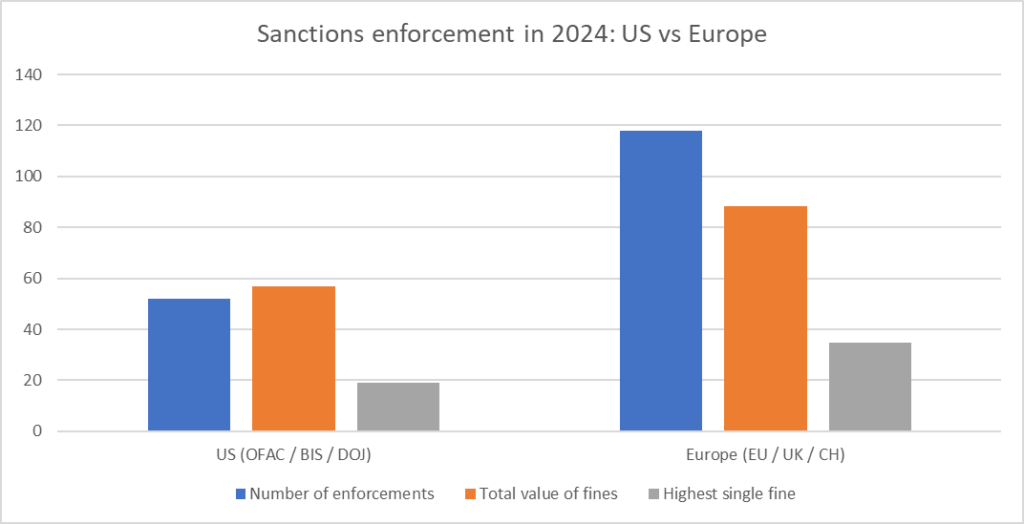With gratitude to a Paulis Iljenkovs of the Latvian FIU who pointed me to the website of Latvian anonymised case law, we can publish details of the criminal convictions to date under the EU’s Russian and Belarusian sanctions regimes.
As per an earlier post (here) it had been reported that there had been seven convictions to over 2022 and 2023. When including cases where companies and individuals were both convicted the correct figure is 10 convictions in 7 cases.
The website including Latvia case law is here. The case numbers provided below can be entered into the “Atlasīt pēc arhīva numura:” window to retrieve the judgments themselves which are in Latvian.
A. Case K77-3109-23. Riga City Court. 30 October 2023.
This case concerned the export of a Bentley Mulsanne Speed luxury vehicle to Russia that was sold for €112,552.69 in breach of the EU’s prohibitions on the export of luxury goods.
The company was convicted and fined €111,600 and had the full proceeds from the sale of the car confiscated as well.
The senior individual within the company was also convicted and personally fined €62,000.
In an earlier post we had reported that the total fine from this case was €170,000, but this sum excluded the confiscation.
B. Case K77-2464-23. Riga City Court. 25 October 2023.
The case was the prosecution of an individual who worked for Rossiya Segodnya, a Russian state media channel (the company is not named in the judgment, but is known from earlier press releases as per our earlier post).
The journalist was prosecuted for making “economic resources” available to a designated person, with Rossiya Segodnya having a designated person – Dmitry Kiselev – as its Director General.
The court held that the work product prepared during the course of employment constituted “economic resources” and that making these available to a designated person was a breach of the asset freeze imposed on Kiselev under the EU’s sanctions.
The fine was €6,820.
C. Case K77-2465-23. Riga City Court. 26 June 2023.
This case is twinned with Case B (K77-2464-23) above. The prosecution was of another journalist working for the same organisation, and the same case theory of the work product constituting “economic resources” was pursued.
In this instance, however, the journalist pleaded guilty and expressed remorse.
As part of a plea deal the individual was sentenced to 140 hours of community service.
The judgment itself concerned whether this plea deal was procedurally proper as a matter of Latvia law, and it was upheld.
D. Case K77-3055-23. Riga City Court. 17 October 2023.
This case was the prosecution of a company and individual for importing gas cylinders and valves from Belarus in breach of import prohibitions under the EU’s sanctions. The contract value was €73,508.
A senior person within the company, and the company itself were prosecuted and convicted.
The individual was fined €12,400.
The company was fined double that sum – €24,800, and had profits of €9,500 confiscated. This figure is not explained but may have been the profit made from on-selling the imported goods. The company was also banned from conducting any further business with Belarus for a year.
E. Case K12-0283-23. Daugavpils Court. 14 April 2023.
We have posted on this conviction previously.
The case concerned the conviction of an individual for importing 8kg of nails and 13 consignments of railway sleepers from Belarus in breach of the EU’s sanctions.
The man was fined €6,200 and barred from importing any goods from Belarus for a year.
A co-accused was also convicted (the judgment for which could not be found on the case law website) and was fined €5,000 and given a similar ban from importing any goods from Belarus for a year.
F. Case K77-1597-23. Riga City Court. 20 February 2023.
This case concerned the transfer of a professional football player from a Latvian club to a Belarussian club that was 79% owned by a designated person.
The transfer fee was US$50,000.
The player was treated in the judgment as an “economic resource” made available to a designated person in breach of the EU’s asset freeze.
The senior individual at the Latvian club pleaded guilty and was fined €6,200.
The club was also convicted and had the full US$50,000 transfer fee confiscated.

